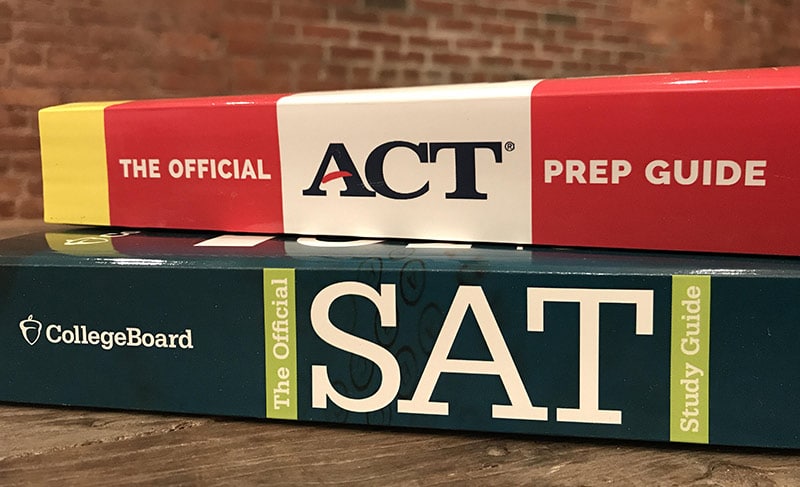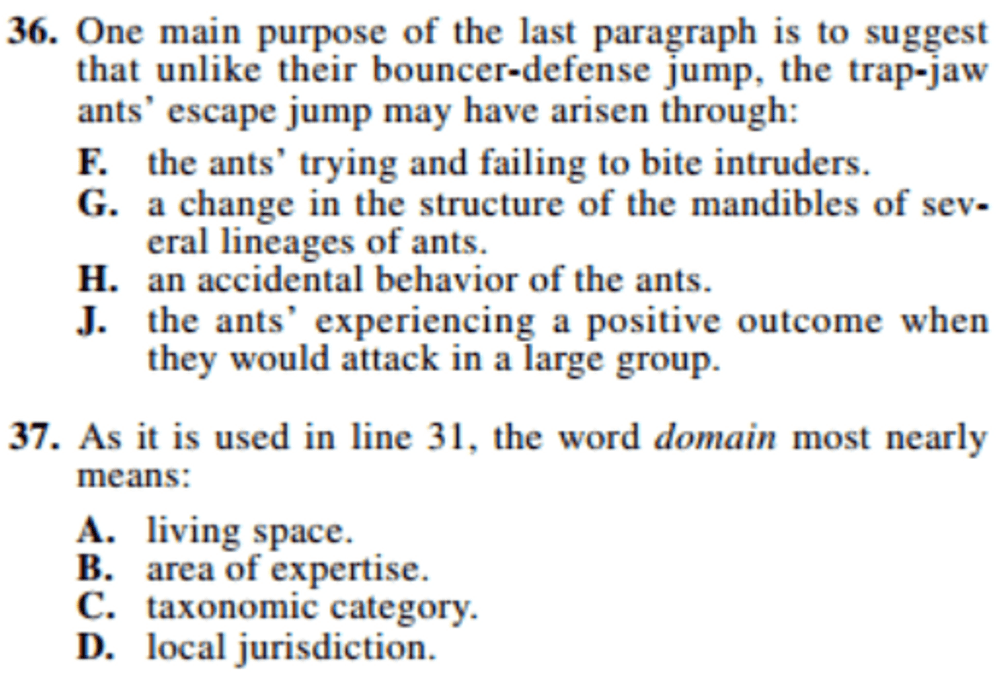The distinctions between these two examinations are usually well understood by students, but they’ve also picked up a lot of half-truths and urban legends from their peers, instructors, and guidance counsellors. However, the stemmed idea behind both the examinations is the same- to test the candidates’ readiness for the college. At first glance, these two tests might look very similar, but there is a bold line of difference between the two.
Jumping to easy decisions might seem tempting; however, do not succumb to temptation and take a closer look at the differences to trace clarity.
What is SAT?
The SAT test is a very significant test that colleges and institutions around the United States use to determine student admittance and scholarships. Evidence-Based Reading, Writing, and Mathematics are all parts of the SAT test.
To know more about the latest updates on SAT; Kindly Read: What’s New in SAT 2021: Syllabus Updates, New Marking Scheme and More!
What is ACT?
This is a standardization examination that tests the student’s knowledge in English, Science, Maths, and Reading. The American College Testing examination also offers the students an optional direct writing test, which assesses the student’s readiness to join the preferred college.
What are the benefits of the SAT examination?
- The SAT preparation practise questions are well-designed to give students a world-class learning experience.
- It uses a video explanation and plug-and-play study regimen to assist you in optimising your score.
- Following the completion of each exam, SAT courses give a score analysis.
- It helps you to go through your questions again and see how you may enhance them.
What are the benefits of the ACT examination?
- Provides guided study time so you may concentrate on your weakest areas.
- It boosts your ACT exam confidence.
- Students are able to learn effectively.
- It enables you to answer Math problems without the use of a calculator.
- After earning a decent grade on the exam, you may easily apply for a scholarship.
Which examination is preferred by the colleges, SAT or ACT?
Ivy League and west coast institutions favoured the SAT in the Stone Age, while Midwestern universities chose the ACT. However, those distinctions are no longer present. Today, the difference is pretty negligent; thus, you must resort to the choice which works the best for you after understanding the concept of both the tests in detail.
The score scale difference between the SAT and ACT Examination

The SAT is graded on a scale of 400 to 1600 points, whereas the ACT is graded on a scale of 1-36 points. You should keep in mind that you will only be scored for each correct answer you provide, and you will not receive any penalty for incorrect answers on the ACT, but you would receive a 14 penalty on the SAT.
SAT or ACT, which one is more difficult?
It is very hard to put a label on either of them since the level of difficulty depends upon the knowledge of the test taker’s preference. However, there are very subtle differences, yet the minor ones can help you to finalize your pick.
Mathematics:
The level of difficulty when it comes to both the examinations is similar; however, if you are not comfortable with the quantitative skills, then here is a list of differences you must consider.
- The SAT contains a 20-question part for math without calculators. However, they argue that none of the questions need pupils to use the device in the first place. The ACT permits calculators to be used during the exam.
- The ACT places a strong emphasis on areas that aren’t as prominent on the SAT. On ACT tests, you’ll find matrices, trigonometry, logarithms, and geometry (planar and coordinate). However, most of the problems are devoted to different levels of algebra.
- The SAT, on the other hand, emphasises mathematics, problem-solving, and data analysis, as well as the ability to comprehend and analyse expressions.
Science:
Through the new SAT format contains a fixed number of texts in the Reading portion, the Science section is primarily about data and graph interpretations, including Science, Social Studies, and a passage in literature. There are no precise formulas or information that you must know.
However, there is a distinct Science component in the ACT. Though it focuses on abilities rather than facts and formulas, you should have some prior scientific method analysis and reasoning expertise. In addition, unlike the SAT, the ACT generates a distinct Science portion score. However, the SAT does give cross-test results in Science Analysis and History/Social Studies.
Essay:
On the SAT, students are given a passage and asked to explain how the author constructs an argument using the material previously supplied by the author – evidence, logic, and so on. The learner is required to convey their understanding of the complicated material rather than give their own subjective judgment.
In the ACT, students are given a brief paragraph and a variety of views. They are supposed to analyse the points of view and compare and contrast them.
Which examination allows more time in hand, SAT or ACT?

The exams last about the same amount of time overall, but considering the number of questions in each section, it appears that the SAT gives you a little more time to think about each popping question.
On the ACT, anyone experiencing test anxiety may encounter a somewhat longer time constraint. Unlike the SAT, however, the ACT solely contains multiple-choice questions. The SAT, on the other hand, frequently requires student answers that aren’t listed as an option.
Key Differences between ACT and SAT:
| ACT | SAT | |
| Section Sequence | 1. English 2. Math 3. Reading 4. Science 5. Writing (optional) | 1. Reading 2. Writing and Language 3. Math No Calculator 4. Math Calculator |
| Time Duration | 2 hrs 55 mins without Writing 3 hrs 35 mins with Writing | 3 hrs total |
| Time Division Per Section | English: 45 mins Math: 60 mins Reading: 35 mins Science: 35 mins Writing (optional): 40 mins | Reading: 65 mins Writing and Language: 35 mins Math No Calculator: 25 mins Math Calculator: 55 mins |
| Number of Questions per Section | English: 75 questions Math: 60 questions Reading: 40 questions Science: 40 questions Writing (optional): 1 essay Total score range: 1-36 | Reading: 52 questions Writing and Language: 44 questions Math No Calculator: 20 questions Math Calculator: 38 questions |
| Cost | $60 without Writing $70 with Writing | $52 |
| Who Accepts Scores? | Accepted by all colleges and universities in the US | Accepted by all colleges and universities in the US |
| Score range | Total score range: 1-36 Every section uses a scale of 1-36. –Your total score is the average of your four section scores. | Total score range: 400-1600 The Math and Evidence-Based Reading and Writing (EBRW) sections each use a scale of 200-800 and are combined for a total score. |
In-depth View of Differences between ACT and SAT
1. Time Per Question:
If you are somebody who do not prefer time crunches; then SAT is the exam you should prepare for. The reason behind this is the SAT gives you more time per question on all the sections than the ACT does. Lets have a look at a chart to understand better:
| ACT | SAT | |
| Reading | 53 sec/question | 75 sec/question |
| ACT English/SAT English | 36 sec/question | 48 sec/question |
| Science | 60 sec/question | No Calculator: 75 sec/question Calculator: 87 sec/question |
| Math | 53 sec/question | N/A |
So if you’re concerned about time management, especially on math questions, then it is highly recommended to chose SAT as it offers less stress-inducing time restrictions
2. Science Section
There is another stark difference between both the exam and that is the Science section: 40 questions with a time duration of 35 minutes and it constitutes one-fourth of your total ACT score. Unlike SAT, the ACT include a section completely for science. So, if science is one of your strongest pursuit ACT exam will more beneficial to you than SAT exam.
This does not mean SAT does not include Science topics, it does- scientific test concepts, but it doesn’t have a special devoted section for Science. Question on the SAT deals with scientific passages, data, and charts on the Reading, Writing, and Math sections.
3. No calculator
In the ACT exam, a student can use a calculator on all Math questions, whereas in SAT exam, there is a Math “No Calculator” subsection for which you may not use a calculator.

4. Math Concepts
If one talks about the Math content, both SAT, and ACT pay great importance to algebra. But unlike SAT, ACT also examines few concepts; for example, matrices, graphs of trig functions, logarithms, etc. Also, geometry makes up about 30-45% of ACT Math. But in SAT, the geometry segment marks for less than 10% of SAT Math questions. The same goes for trigonometry, as ACT gives slightly higher importance to it than SAT.
As a result, if you are good at algebra and data analysis should opt for SAT and if you are more comfortable with trig functions and geometry and are comfortable with matrices and logs, then go for the ACT Exam.
5. Chronological Reading Questions
Unlike ACT Reading, all the questions given to you in SAT reading follow a chronological order, that is, follow the order of the content in the passages. But in ACT reading, the question flow is random and does not follow any order.

Thus, SAT Reading becomes easier to follow and answer than ACT Reading questions. And it also saves time as you won’t have to search the complete passage for the area to which a question is referring.
Should you take up both SAT and ACT?
In general, we advise avoiding taking the SAT and the ACT at the same time. You’re dividing your test prep efforts and committing to more coffee-packed Saturday mornings at a testing centre, reducing your time for studying school tests, taking up activities, and avoiding social life.
There are a few exceptions to this rule:
- You’re a VERY good test-taker aiming for the most competitive institutions, and you’re quite sure you’ll ace both tests. Some of the best institutions (including a few Ivies) have stated that they want to see both scores. It provides them with further evidence that you are powerful on all fronts. Please don’t interpret this as a command. If you need to concentrate all of your efforts on one exam in order to achieve a high score, do so.
- You’ve begun your testing early and realised you need to alter your strategy. Perhaps your ACT scores have plateaued, and you’d like to take the SAT. Alternatively, vice versa. If you do this, make sure you have enough time to focus on one exam in particular during your preparation. If at all feasible, take the ACT in February and the SAT in May, giving yourself three months to switch gears. However, because the SAT and ACT are becoming more comparable, you may find that you require less time in between.
Now, scooting one step closer to the preparation, the big undertaking of commencing your studies may look daunting; however, the best way to move ahead is to gear yourself with tips. We have prepared a list of easy tips to ace both the SAT and ACT examinations. Let’s take a look, shall we?
1. The art of eliminating:

This is one of the best tricks which is used by scores of students when they struggle with a particular question. Become extremely picky and toss away the answers on strong reasoning to ensure that you can narrow down to the correct answer.
2. Challenge your mistakes:
Dramatic improvements and good scores are only possible if you learn to challenge your mistakes at every step to trace perfection. Pinpoint your mistakes, make a list of your weaknesses, work on them, time yourself and try to pick banks of questions that challenge your mind. In no time, you will witness positive changes in your score.
3. Read strategically:
To nail your reading comprehension skills, it is important to stay comfortable with the content you are skimming through. The best way to hop on the strategic ride- which involves skimming a paragraph quickly, jumping to the questions, and then reading the paragraphs thoroughly.
4. Never ignore paragraph introductions:
The introduction of the paragraphs may look like word diarrhoea, which is actually the introductory blurb. This generally has valuable information which can be asked in the questions; thus, never skip it.
5. Pinning evidence:
A myriad range of questions on the SAT/ACT question paper may seem very subjective; however, there will never be anything beyond the logical deductions. Answers and facts are always there even if they appear to be hidden, thus scrounging for evidence to back up your answers is the best tip.
6. Memorize formulas and grammar rules:

The question paper provides you with the mathematical formulas; however, if you go to and fro for the reference, you will lose out on the momentum and time. On the other hand, when it comes to grammar, the rules are never enough; you need to keep brushing up on the guidelines to ace your examination.
7. The art of picking the concise one:
Your question paper may look like it has two correct answers; however, you cannot go with anyone. There must be some trick to it, thus pick the one which seems concise and to the point.
The ultimate decision
Each examination has benefits; it is for you to self-introspect and checks which one has more positives and aligns with your goals. Given all of the non-biased considerations shown thus far, the test taker must ultimately pick which style best matches him or her. To begin, practise both and assess your comfort level with the patterns. In the end, it should be a matter of personal preference.
Once you have decided which test works the best for you in terms of studying, practicing, and utility, then there is nothing stopping you. Scores of students try and take the mid-way wherein they prepare for both the tests; however it is better to ace one exam rather than juggle with the multitasking process. At the end of the day, no one knows you and your goals better than yourself.
Best of luck, see you on the other side!
Frequently Asked Questions
Q1. What are the differences between the SAT and the ACT?
In relation to ACT, the SAT has:
● A better reading ability
● more swapping between issue kinds
● During the exam, covering the arithmetic and writing parts, there will be additional reading.
In relation to SAT, the ACT has :
● A weaker reading ability
● A scientific part on its own
● More difficult scheduling (more questions to respond in shorter time)
Q2. Is it better to take the SAT or the ACT while registering for universities?
The basic explanation is that today’s universities don’t generally differentiate between the SAT and the ACT because both results could be utilized to evaluate entrance and scholarship qualification.
Q3. What is easy, the SAT or the ACT?
Both examinations are meant to measure students’ intellectual understanding and skills through a 3-4 hour standardised evaluation. Though you may find one exam simpler than the others, this is primarily down to your particular ability for one exam’s questioning type and topic concentration. As a result, there really is no correct or incorrect response.
Q4. Which exam is more extensive, the SAT or the ACT?
The writing part of the SAT takes 3 hours and 50 minutes, not counting the 15-minute interval among parts. If you don’t complete the writing section of the SAT, you’ll devote precisely 3 hours to the exam, not counting your 15-minute rests.
The writing part of the ACT takes 3 hours and 35 minutes, not counting pauses among parts. The ACT will run for 2 hours and 55 minutes, excluding the essay component, not counting pauses.
Q5. What is an “appropriate” SAT or ACT result?
Students should completely eliminate the terms “good” and “bad” from their language. Rather, they should think about how their SAT or ACT scores relate to their own objectives. Establishing a stated goal is the first step in this procedure since it gives them a concrete aim to aspire towards.




